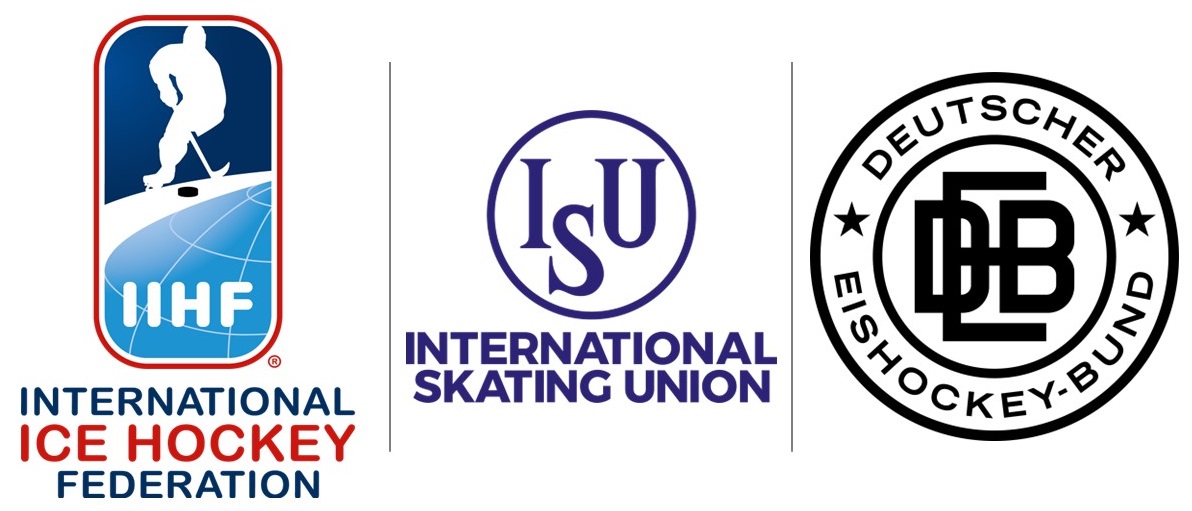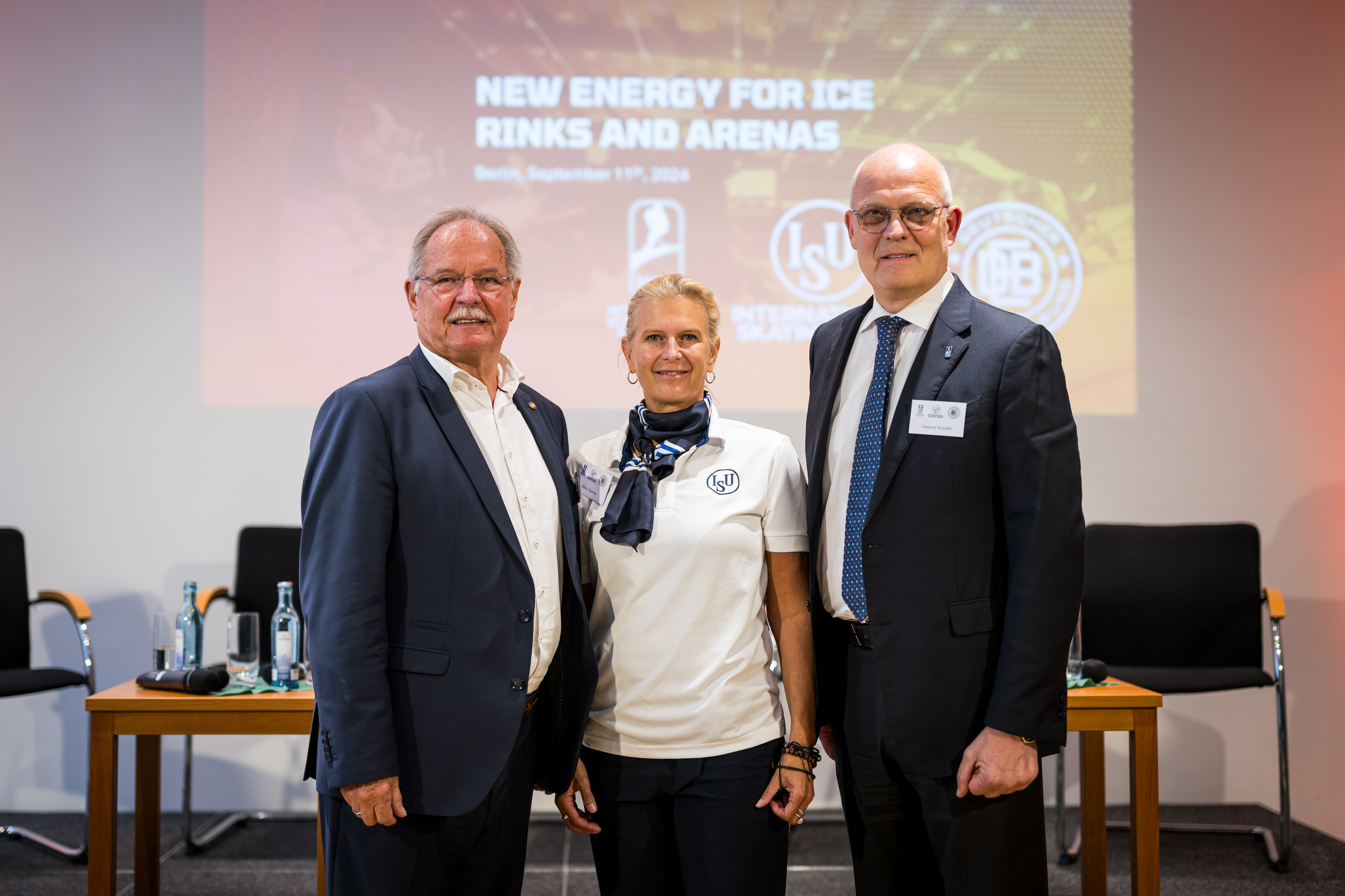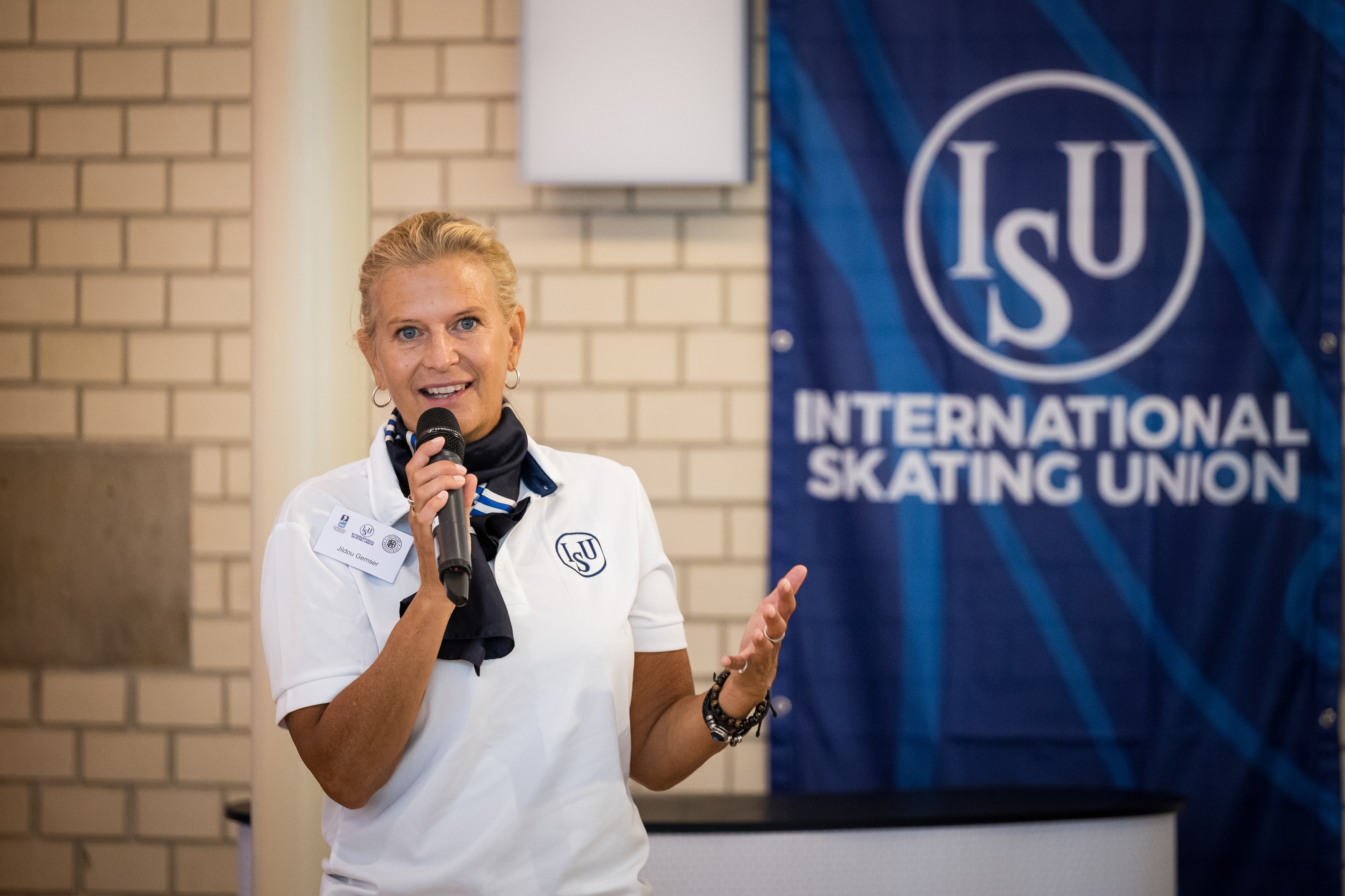Sustainability
ISU and IIHF set the stage for sustainability synergies with first-ever joint conference
23 Sep 2024

Investing energy and collaborative efforts into the development of sustainable ice rinks is a key priority for the International Skating Union (ISU). Led by this conviction, the ISU recently joined the International Ice Hockey Federation (IIHF) and the German Ice Hockey Federation (DEB) in hosting the first ever Sustainability Conference for ice sports “New Energy for Ice Rinks and Arenas”. Held in Berlin (GER) on September 11th, 2024, this event aimed at creating a platform for worldwide experts in the field to foster synergies, share technical knowledge and boost innovative solutions in support of more eco-friendly ice rinks.
Bringing together over 100 key players from the worldwide ice sports industry – including architects, technical ice experts, sustainability and policy consultants as well as leading scientific academics – the conference featured 12 presentations highlighting sustainability developments in the construction, renovation and utilization of ice rinks and arenas.

Members of the panel from left to right: Peter Mertens (DEB President), Jildou Gemser (Coordinator ISU Development Commission), Viesturs Koziols (IIHF Council Member and Chairman of the IIHF Facilities Committee). PHOTO: © JAN-PHILIPP BURMANN / CITY PRESS GMBH BILDAGENTUR
Present for this special occasion, the ISU Development Commission Coordinator, Jildou Gemser, had the honor of giving an opening speech to the assembly, along with Viesturs Koziols, IIHF Council Member and Chairman of the IIHF Facilities Committee, and Dr. Peter Merten, President of the German Ice Hockey Federation. United by shared sustainability priorities and values, they emphasized the importance of balancing economic and ecological considerations in managing ice facilities, underscoring the need for innovative partnerships while ensuring long-term viability.
A hub for sustainability expertise
Discussions around the latest green technologies in ice-making, energy efficiency and water conservation took center stage during the conference. These trends apply to the construction of new buildings, but also to renovation projects that offer interesting results in terms of carbon footprint reduction. As part of the debates, the participants explored a large variety of scientifically researched techniques capturing the entire operation cycle of ice rink arenas - including the manufacturing process of artificial (polymer-based) ice to expand horizons on alternative ice surfaces possibilities.
 Jildou Gemser (Coordinator ISU Development Commission) PHOTO: © JAN-PHILIPP BURMANN / CITY PRESS GMBH BILDAGENTUR
Jildou Gemser (Coordinator ISU Development Commission) PHOTO: © JAN-PHILIPP BURMANN / CITY PRESS GMBH BILDAGENTUR
A collaborative path forward
Small joint efforts across all ice-dependent sports are those that will make the biggest impact – this is the key message that achieved unanimity among guest speakers during the conference. No single club, arena operator or sports organization can lead the fight against climate change alone. Because they all share the same ice and facilities, collaboration opportunities between curling, luge, bobsleigh, hockey and skating hold considerable potential to make effective progress in water and energy use. Exchanging good practices, technical know-how and creating alliances across sports federations were identified as crucial tools to raise awareness, educate and promote environmental stewardship among the broader sports community.
By joining forces, the ISU, IIHF, and DEB concluded this conference by committing to enhance transnational and cross-sports synergies with the goal to spur sustainable events, while upholding high-quality standards and experiences for athletes and spectators alike.
To learn more about the ISU Sustainability Strategy, please visit the webpage here.
About IIHF
The IIHF, founded on 15 May 1908 in Paris, France, is the governing body of international ice hockey. The IIHF features 83 member associations (MNAs), each of which is the national governing body of the sport in its nation. Besides controlling the international rulebook, processing international player transfers, and dictating officiating guidelines, the IIHF runs numerous development programmes designed to bring hockey to a broader population. The IIHF also presides over ice hockey in the Olympic Games, and over the IIHF World Championships at all levels, men, women, juniors under-20, juniors under-18 and women under-18.
About ISU
The International Skating Union (ISU), founded in 1892, is the oldest governing international winter sport federation as well as the exclusive international sport federation recognized by the International Olympic Committee (IOC) administering the sports of Figure Skating (Single & Pair Skating and Ice Dance), Synchronized Skating, Speed Skating and Short Track Speed Skating worldwide. The objectives of the ISU are to regulate, govern, promote and develop its sports on the basis of friendship and mutual understanding between athletes. Currently, three ISU disciplines are included in the Olympic Winter Games program (Figure Skating, Speed Skating and Short Track Speed Skating). For further information please visit isu.org.
About German Ice Hockey Federation
The German Ice Hockey Federation was founded on June 16, 1963, in Krefeld - but today, the head office is located in Munich. The German Ice Hockey Federation includes 16 regional sports associations and 99 clubs with over 20,000 active members. One of the Federation's flagship features is its national teams. With men's, women's, and youth teams, the Federation oversees nine national teams. Additionally, the German Ice Hockey Federation e.V. is also responsible for the Women's First League (DFEL), the Men’s Third League (Oberliga), and the Youth Leagues. The training and further education of coaches and referees also falls within the responsibility of the Federation.








